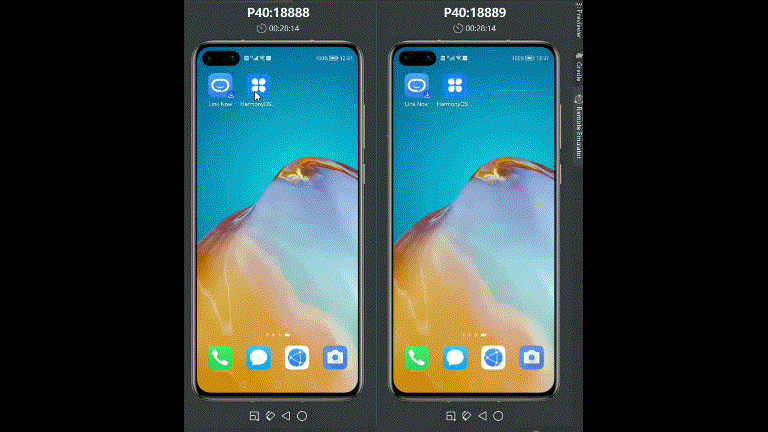HarmonyOS鸿蒙Next“井”字小游戏
HarmonyOS鸿蒙Next“井”字小游戏 运行效果如下:

这个小游戏是我小时候经常和同桌无聊的时候一起玩的。那个时候的快乐很简单,两个人,两支笔,一张草稿纸就能大战三百回合!
小游戏实现的功能很简单,就是两台设备通过分布式来同步笔记。
(听说最新的版本里面,就算A设备里面没有下载B设备中的某个APP,也可以通过分布式从B设备中流转到A设备里面运行?期待ing!!!这才是真正的突破了硬件的限制!!!)
1、设备连接
还是之前那个思想,能找到封装好的代码,就不重复造轮子
对于设备连接,SelectDeviceDialog和DevicesListAda封装的已经很好了,直接拿来用就行了,有需要的可以稍微修改下UI界面啥的。
package com.huawei.codelab.devices;
import com.huawei.codelab.ResourceTable;
import ohos.agp.components.Component;
import ohos.agp.components.LayoutScatter;
import ohos.agp.components.ListContainer;
import ohos.agp.utils.LayoutAlignment;
import ohos.agp.window.dialog.CommonDialog;
import ohos.app.Context;
import ohos.distributedschedule.interwork.DeviceInfo;
import java.util.List;
/**
* Select Device Dialog
*
* @since 2021-01-11
*/
public class SelectDeviceDialog {
private static final int DIALOG_WIDTH = 840;
private static final int DIALOG_HEIGHT = 900;
private CommonDialog commonDialog;
/**
* SelectDeviceDialog
*
* @param context Context
* @param devices List
* @param listener SelectResultListener
* @since 2021-03-12
*/
public SelectDeviceDialog(Context context, List<DeviceInfo> devices, SelectResultListener listener) {
initView(context, devices, listener);
}
private void initView(Context context, List<DeviceInfo> devices, SelectResultListener listener) {
commonDialog = new CommonDialog(context);
commonDialog.setAlignment(LayoutAlignment.CENTER);
commonDialog.setSize(DIALOG_WIDTH, DIALOG_HEIGHT);
commonDialog.setAutoClosable(true);
Component dialogLayout = LayoutScatter.getInstance(context).parse(ResourceTable.Layout_dialog_select_device, null, false);
commonDialog.setContentCustomComponent(dialogLayout);
if (dialogLayout.findComponentById(ResourceTable.Id_list_devices) instanceof ListContainer) {
ListContainer devicesListContainer = (ListContainer) dialogLayout.findComponentById(ResourceTable.Id_list_devices);
DevicesListAdapter devicesListAdapter = new DevicesListAdapter(devices, context);
devicesListContainer.setItemProvider(devicesListAdapter);
devicesListContainer.setItemClickedListener((listContainer, component, position, id) -> {
listener.callBack(devices.get(position));
commonDialog.hide();
});
}
dialogLayout.findComponentById(ResourceTable.Id_cancel).setClickedListener(component -> {
commonDialog.hide();
});
}
/**
* Show Dialog
*/
public void show() {
commonDialog.show();
}
/**
* select device result call back interface
*
* @since 2021-01-12
*/
public interface SelectResultListener {
/**
* callBack
*
* @param deviceInfo DeviceInfo
*/
void callBack(DeviceInfo deviceInfo);
}
}
package com.huawei.codelab.devices;
import com.huawei.codelab.ResourceTable;
import ohos.agp.components.BaseItemProvider;
import ohos.agp.components.Component;
import ohos.agp.components.ComponentContainer;
import ohos.agp.components.LayoutScatter;
import ohos.agp.components.Text;
import ohos.app.Context;
import ohos.distributedschedule.interwork.DeviceInfo;
import java.util.List;
import java.util.Optional;
/**
* DevicesListAdapter
*
* @since 2021-01-11
*/
public class DevicesListAdapter extends BaseItemProvider {
private static final int SUBSTRING_START = 0;
private static final int SUBSTRING_END = 4;
private List<DeviceInfo> deviceInfoList;
private Context context;
/**
* DevicesListAdapter
*
* @param deviceInfoList deviceInfoList
* @param context Context
* @since 2021-03-12
*/
public DevicesListAdapter(List<DeviceInfo> deviceInfoList, Context context) {
this.deviceInfoList = deviceInfoList;
this.context = context;
}
@Override
public int getCount() {
return deviceInfoList == null ? 0 : deviceInfoList.size();
}
@Override
public Object getItem(int position) {
return Optional.of(deviceInfoList.get(position));
}
@Override
public long getItemId(int position) {
return position;
}
@Override
public Component getComponent(int position, Component component, ComponentContainer componentContainer) {
ViewHolder viewHolder = null;
Component mComponent = component;
if (mComponent == null) {
mComponent = LayoutScatter.getInstance(context).parse(ResourceTable.Layout_item_device_list, null, false);
viewHolder = new ViewHolder();
if (mComponent.findComponentById(ResourceTable.Id_device_name) instanceof Text) {
viewHolder.devicesName = (Text) mComponent.findComponentById(ResourceTable.Id_device_name);
}
if (mComponent.findComponentById(ResourceTable.Id_device_id) instanceof Text) {
viewHolder.devicesId = (Text) mComponent.findComponentById(ResourceTable.Id_device_id);
}
mComponent.setTag(viewHolder);
} else {
if (mComponent.getTag() instanceof ViewHolder) {
viewHolder = (ViewHolder) mComponent.getTag();
}
}
if (viewHolder != null) {
viewHolder.devicesName.setText(deviceInfoList.get(position).getDeviceName());
String deviceId = deviceInfoList.get(position).getDeviceId();
deviceId = deviceId.substring(SUBSTRING_START, SUBSTRING_END) + "******"
+ deviceId.substring(deviceId.length() - SUBSTRING_END);
viewHolder.devicesId.setText(deviceId);
}
return mComponent;
}
/**
* ViewHolder
*
* @since 2021-03-12
*/
private static class ViewHolder {
private Text devicesName;
private Text devicesId;
}
}
这两个类使用起来也非常方便,可以直接从官方给的CodeLab示例代码中找到
直接调用下图的getDevices就行了
private List<DeviceInfo> devices = new ArrayList<>();
private void getDevices() {
if (devices.size() > 0) {
devices.clear();
}
List<DeviceInfo> deviceInfos = DeviceManager.getDeviceList(ohos.distributedschedule.interwork.DeviceInfo.FLAG_GET_ONLINE_DEVICE);
LogUtil.info(TAG, "MathGameAbilitySlice deviceInfos size is :" + deviceInfos.size());
devices.addAll(deviceInfos);
showDevicesDialog();
}
private void showDevicesDialog() {
new SelectDeviceDialog(this, devices, deviceInfo -> {
startLocalFa(deviceInfo.getDeviceId());
startRemoteFa(deviceInfo.getDeviceId());
}).show();
}
private void startLocalFa(String deviceId) {
LogUtil.info(TAG, "startLocalFa......");
Intent intent = new Intent();
intent.setParam(CommonData.KEY_REMOTE_DEVICEID, deviceId);
intent.setParam(CommonData.KEY_IS_LOCAL, true);
Operation operation = new Intent.OperationBuilder().withBundleName(getBundleName())
.withAbilityName(CommonData.ABILITY_MAIN)
.withAction(CommonData.DRAW_PAGE)
.build();
intent.setOperation(operation);
startAbility(intent);
}
private void startRemoteFa(String deviceId) {
LogUtil.info(TAG, "startRemoteFa......");
String localDeviceId = KvManagerFactory.getInstance().createKvManager(new KvManagerConfig(this)).getLocalDeviceInfo().getId();
Intent intent = new Intent();
intent.setParam(CommonData.KEY_REMOTE_DEVICEID, localDeviceId);
intent.setParam(CommonData.KEY_IS_LOCAL, false);
Operation operation = new Intent.OperationBuilder().withDeviceId(deviceId)
.withBundleName(getBundleName())
.withAbilityName(CommonData.ABILITY_MAIN)
.withAction(CommonData.DRAW_PAGE)
.withFlags(Intent.FLAG_ABILITYSLICE_MULTI_DEVICE)
.build();
intent.setOperation(operation);
startAbility(intent);
}
2、前端界面的绘制
ability_main
<?xml version="1.0" encoding="utf-8"?>
<DirectionalLayout
xmlns:ohos="http://schemas.huawei.com/res/ohos"
ohos:height="match_parent"
ohos:width="match_parent"
ohos:orientation="vertical">
<Text
ohos:height="match_content"
ohos:width="match_content"
ohos:layout_alignment="horizontal_center"
ohos:padding="10vp"
ohos:text="基于HarmonyOS分布式技术的"
ohos:text_size="20vp"
ohos:top_padding="20vp"/>
<Text
ohos:height="match_content"
ohos:width="match_content"
ohos:layout_alignment="horizontal_center"
ohos:text="‘井’字小游戏"
ohos:text_size="20vp"/>
<Image
ohos:height="350vp"
ohos:width="match_parent"
ohos:left_margin="10vp"
ohos:right_margin="10vp"
ohos:image_src="$media:picture_10"/>
<Button
ohos:id="$+id:math_game"
ohos:height="100vp"
ohos:width="300vp"
ohos:background_element="$graphic:background_button"
ohos:layout_alignment="horizontal_center"
ohos:left_padding="15vp"
ohos:right_padding="15vp"
ohos:text="‘井’字小游戏"
ohos:text_size="30vp"
ohos:top_margin="20vp"/>
</DirectionalLayout>
game
<?xml version="1.0" encoding="utf-8"?>
<DependentLayout
xmlns:ohos="http://schemas.huawei.com/res/ohos"
ohos:background_element="#eeeeee"
ohos:height="match_parent"
ohos:orientation="vertical"
ohos:width="match_parent">
<DependentLayout
ohos:height="match_parent"
ohos:id="$+id:bac_area"
ohos:width="match_parent">
<DirectionalLayout
ohos:height="match_parent"
ohos:orientation="vertical"
ohos:width="match_parent">
<DependentLayout
ohos:height="50vp"
ohos:id="$+id:header"
ohos:width="match_parent">
<Text
ohos:id="$+id:text_title"
ohos:align_parent_left="true"
ohos:height="match_content"
ohos:left_margin="12vp"
ohos:text="远程画图页面"
ohos:text_size="38fp"
ohos:vertical_center="true"
ohos:width="match_content"/>
<Button
ohos:height="match_parent"
ohos:width="100vp"
ohos:id="$+id:clear_points"
ohos:text="清除"
ohos:auto_font_size="true"
ohos:background_element="$graphic:background_button"
ohos:align_parent_right="true"/>
</DependentLayout>
<DirectionalLayout
ohos:height="match_content"
ohos:id="$+id:product_list"
ohos:orientation="vertical"
ohos:width="match_parent"/>
</DirectionalLayout>
</DependentLayout>
<Component
ohos:height="6px"
ohos:width="match_parent"
ohos:top_margin="250vp"
ohos:left_margin="10vp"
ohos:right_margin="10vp"
ohos:background_element="#000000"/>
<Component
ohos:height="6px"
ohos:width="match_parent"
ohos:left_margin="10vp"
ohos:right_margin="10vp"
ohos:top_margin="450vp"
ohos:background_element="#000000"/>
<Component
ohos:height="match_parent"
ohos:width="6px"
ohos:top_margin="150vp"
ohos:bottom_margin="50vp"
ohos:left_margin="100vp"
ohos:background_element="#000000"/>
<Component
ohos:height="match_parent"
ohos:width="6px"
ohos:left_margin="250vp"
ohos:top_margin="150vp"
ohos:bottom_margin="50vp"
ohos:background_element="#000000"/>
</DependentLayout>
因为我也是刚开始学习分布式,再加上最近事儿比较多,所以本贴主要就是展示“井”字小游戏啦!
同时,也期待能够在HDC开发者大会上见到HarmonyOS 3.0!!!提前祝各位1024节快乐呀!!!愿鸿蒙越做越好,争取早日走向世界!!!
更多关于HarmonyOS鸿蒙Next“井”字小游戏的实战教程也可以访问 https://www.itying.com/category-93-b0.html
老哥有源码吗,最近在学分布式相关内容,能不能发我一份参考下,非常感谢!
更多关于HarmonyOS鸿蒙Next“井”字小游戏的实战系列教程也可以访问 https://www.itying.com/category-93-b0.html
参考官方codelab:https://developer.huawei.com/consumer/cn/codelabsPortal/carddetails/Distribute-Database-Draw
- 作者: harp
- 创建时间: 2024年2月29日
- 最后修改时间: 2024年2月29日
666,人的创造力果然是无限的
要是能加上判输赢就好了,
确实…哪天有空整整,嘿嘿(≧∇≦*)
HarmonyOS鸿蒙Next的“井”字小游戏是一款基于鸿蒙系统开发的经典双人策略游戏。玩家通过点击3x3的网格,轮流放置“X”或“O”,目标是在水平、垂直或对角线上先连成一条线。该游戏充分利用了鸿蒙系统的分布式能力,支持多设备协同操作,用户可以在手机、平板或智慧屏等设备上无缝切换游戏体验。同时,游戏界面简洁流畅,操作响应迅速,展现了鸿蒙系统的高效性能与用户体验优化。






